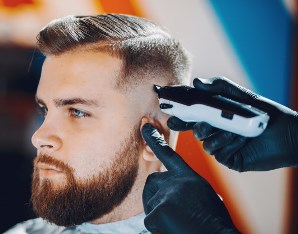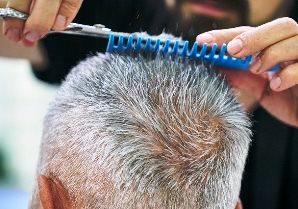How to Select the Right Barbering Training Near Belmont Massachusetts
 Since you have decided to enroll in a barber school near Belmont MA, the process starts to find and enroll in the best school. It's imperative that the school you choose not only furnishes the necessary education for the specialty you have chosen, but also prepares you for passing the licensing examination. When you begin your preliminary search, you may be a little bit confused about the distinction between beauty schools and cosmetology schools, which both may offer barbering programs. Well don't be, because the titles are basically interchangeable and both refer to the same kind of school. We'll talk a bit more concerning that in the upcoming segment. If you anticipate commuting to classes you will need to find a school that is within driving distance of your Belmont residence. Tuition will also be a critical factor when assessing prospective barber schools. Just remember that because a school is the nearest or the lowest cost it's not necessarily the right option. There are a number of other factors that you should weigh when reviewing schools, for instance their reputation and accreditation. We will review what questions you should ask about the barber colleges you are considering later within this article. Before we do, let's talk a bit about what barbering is and why you may want to become a barber.
Since you have decided to enroll in a barber school near Belmont MA, the process starts to find and enroll in the best school. It's imperative that the school you choose not only furnishes the necessary education for the specialty you have chosen, but also prepares you for passing the licensing examination. When you begin your preliminary search, you may be a little bit confused about the distinction between beauty schools and cosmetology schools, which both may offer barbering programs. Well don't be, because the titles are basically interchangeable and both refer to the same kind of school. We'll talk a bit more concerning that in the upcoming segment. If you anticipate commuting to classes you will need to find a school that is within driving distance of your Belmont residence. Tuition will also be a critical factor when assessing prospective barber schools. Just remember that because a school is the nearest or the lowest cost it's not necessarily the right option. There are a number of other factors that you should weigh when reviewing schools, for instance their reputation and accreditation. We will review what questions you should ask about the barber colleges you are considering later within this article. Before we do, let's talk a bit about what barbering is and why you may want to become a barber.
Why Become a Barber?
A barber is a professional who cuts, trims, and styles hair for primarily male clients, though many women with shorter hairstyles opt to go to these professionals too. Most barbers also provide facial hair maintenance, custom shaves and other men's grooming services. The goal of a barber is to make each client feel comfortable and at ease while their hair is being cut or styled. The barber also seeks to ensure that the client is happy with his or her hairstyle, length and color or his new facial hair style. They usually use tools such as scissors, clippers, razors, and combs Barbers may also provide other services such as applying lotions, shampooing, styling, coloring hair, and singeing. In addition, a barber may perform massage services for the scalp, neck, and face. Finally, barbers will typically bill the client, accept payment and tips and finalize the sale. They may also sell the client products such as shampoo, lotions, or tonics that will meet their styling, grooming and maintenance needs between appointments. They will clean their work area and tools according to the state's safety and sanitation requirements after each appointment.
Questions to Ask Barbering Schools
 Below is a series of questions that you will want to research for any barber school you are considering. As we have already covered, the location of the school in relation to your Belmont MA residence, together with the cost of tuition, will probably be your primary qualifiers. Whether you would like to pursue a certificate, diploma or a degree will undoubtedly be next on your list. But once you have narrowed your school choices based on those initial qualifications, there are even more factors that you must research and take into consideration before enrolling in a barber college. Following we have collected some of those supplemental questions that you should ask each school before making a final determination.
Below is a series of questions that you will want to research for any barber school you are considering. As we have already covered, the location of the school in relation to your Belmont MA residence, together with the cost of tuition, will probably be your primary qualifiers. Whether you would like to pursue a certificate, diploma or a degree will undoubtedly be next on your list. But once you have narrowed your school choices based on those initial qualifications, there are even more factors that you must research and take into consideration before enrolling in a barber college. Following we have collected some of those supplemental questions that you should ask each school before making a final determination.
Is the Barber College Accredited? It's essential to make certain that the barber training program you select is accredited. The accreditation should be by a U.S. Department of Education recognized local or national organization, such as the National Accrediting Commission for Cosmetology Arts & Sciences (NACCAS). Schools accredited by the NACCAS must measure up to their high standards assuring a superior curriculum and education. Accreditation can also be important for securing student loans or financial aid, which typically are not offered in Belmont MA for non- accredited schools. It's also a requirement for licensing in many states that the training be accredited. And as a final benefit, numerous employers will not recruit recent graduates of non-accredited schools, or may look more favorably upon those with accredited training.
Does the School have an Excellent Reputation? Every barber school that you are seriously considering should have a good to exceptional reputation within the field. Being accredited is a good starting point. Next, ask the schools for references from their network of employers where they have placed their students. Verify that the schools have high job placement rates, attesting that their students are highly regarded. Visit rating services for reviews along with the school's accrediting organizations. If you have any connections with Belmont MA barber shop owners or managers, or anyone working in the trade, ask them if they are familiar with the schools you are looking at. They may even be able to suggest others that you had not considered. And finally, check with the Massachusetts school licensing authority to find out if there have been any grievances filed or if the schools are in complete compliance.
What’s the School’s Specialty? Many cosmetology schools offer programs that are broad in nature, concentrating on all areas of cosmetology. Others are more focused, offering training in a specific specialty, for example barbering. Schools that offer degree programs frequently expand into a management and marketing curriculum. So it's imperative that you enroll in a school that specializes in your area of interest. Since your goal is to be trained as a barber, make certain that the school you enroll in is accredited and well regarded for that program. If your desire is to start a barber shop in Belmont MA, then you need to enroll in a degree program that will teach you how to be an owner/operator. Picking a highly rated school with a weak program in barbering will not provide the training you require.
Is Enough Live Training Provided? Studying and refining barbering techniques and abilities demands plenty of practice on people. Find out how much live, hands-on training is provided in the barber courses you will be attending. Some schools have shops on site that make it possible for students to practice their developing skills on volunteers. If a Belmont MA barber school offers minimal or no scheduled live training, but instead depends mainly on the use of mannequins, it may not be the best alternative for cultivating your skills. So try to find alternate schools that furnish this type of training.
Does the School have a Job Placement Program? Once a student graduates from a barber school, it's crucial that she or he receives assistance in finding that first job. Job placement programs are an important part of that process. Schools that furnish aid develop relationships with local employers that are seeking trained graduates available for hiring. Verify that the schools you are considering have job placement programs and find out which Belmont MA area shops and businesses they refer students to. Additionally, find out what their job placement rates are. High rates not only confirm that they have broad networks of employers, but that their programs are highly regarded as well.
Is Financial Aid Available? Many barber schools provide financial aid or student loan assistance for their students. Check if the schools you are looking at have a financial aid office. Talk to a counselor and find out what student loans or grants you may qualify for. If the school belongs to the American Association of Cosmetology Schools (AACS), it will have scholarships accessible to students also. If a school fulfills each of your other qualifications except for cost, do not omit it as an option until you find out what financial aid may be provided in Belmont MA.
How to Choose a Barber School in Belmont
Choose in the Right Belmont Barber College
Locating and enrolling in the right barber training program is important to get the necessary training to become a licensed specialist. Make sure to ask all the questions that you need to so as to feel positive about your decision. Make certain to collect all of the responses you receive from the barber school admissions departments, prioritize what matters the most to you, and then utilize that information to contrast schools. A reasonable beginning in your due diligence procedure is to make sure that the institution and program you select are accredited and have outstanding reputations within the field. If you begin with that base, and address the additional questions presented in this article, you will be able to narrow down your list of schools so that you can make the right choice. Once you graduate and pass your licensing exam, you will be confident that you are qualified to start your new career as a professional barber in Belmont Massachusetts.
